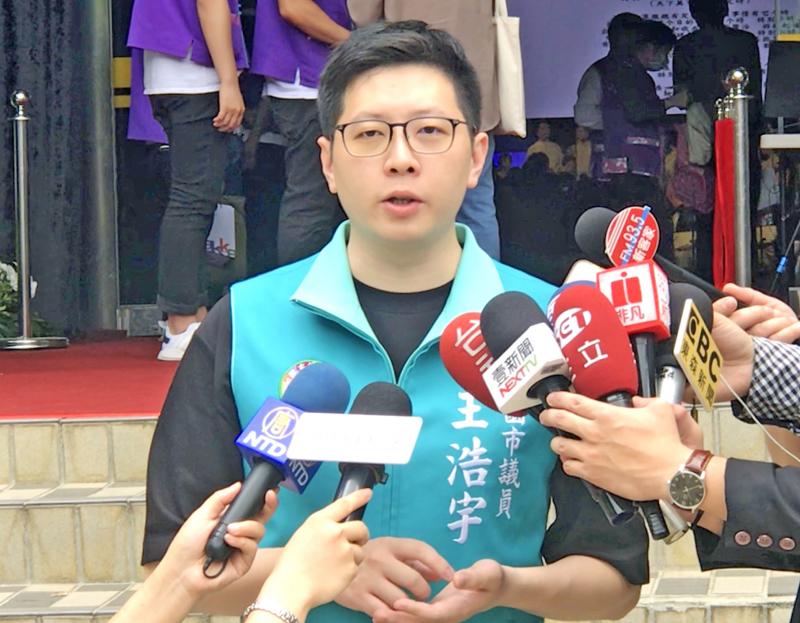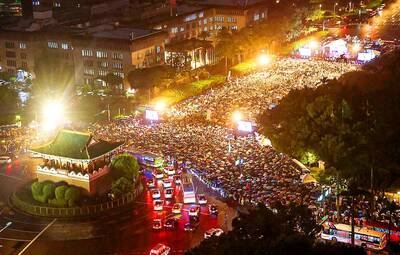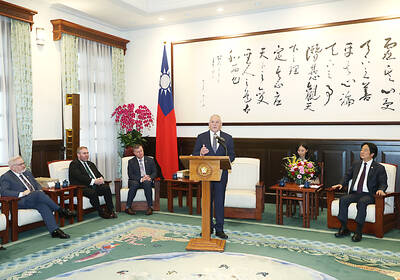Residents in Taoyuan’s Jhongli District (中壢) yesterday voted to recall Democratic Progressive Party (DPP) Taoyuan City Councilor Wang Hao-yu (王浩宇).
Taoyuan City Election Commission data showed that 84,582 people voted in favor of the recall, while 7,128 voted against it.
Voter turnout was 28 percent, it showed.

Photo: Lee Jung-ping, Taipei Times
The votes of at least 25 percent of eligible voters — 81,940 people — and the largest share of votes in favor of a recall are required for a recall motion to pass, according to the Civil Servants Election and Recall Act (公職人員選舉罷免法).
Wang, 32, was first elected as city councilor in 2014, with the second-highest votes among all candidates for Jhongli. He at the time represented the Green Party Taiwan.
He was in 2018 re-elected with the third-highest number of votes.
In January last year, he left the Green Party and a month later joined the DPP.
Hope Media executive officer Tang Ping-jung (唐平榮), a Jhongli resident who proposed the recall campaign said that Wang did not work for the benefit of his constituency.
The campaign was supported by local Chinese Nationalist Party (KMT) and Taiwan People’s Party (TPP) members.
Wang pushed his own opinions on public issues, instead of listening to those who he was elected to represent, Tang said after the vote, celebrating with KMT and TPP members at the headquarters of the campaign.
It is the first time that a city councilor in one of Taiwan’s six special municipalities is recalled, he said.
DPP spokeswoman Yen Juo-fang (顏若芳) said that despite the vote being a local issue, “the KMT threw its whole weight behind it.”
“The campaign was aimed to sow division among Taiwanese. This does not bode well for the nation’s democracy, and most people did not like to see this,” she said.
The KMT in a statement congratulated the “people of Jhongli for sending a strong signal.”
“It was a good result and benefits Taiwan’s democratic development,” the KMT said.
As of press time, Wang had not commented on the recall vote.
Additional reporting by Shih Hsiao-kuang

FINAL COUNTDOWN: About 50,000 attended a pro-recall rally yesterday, while the KMT and the TPP plan to rally against the recall votes today Democracy activists, together with arts and education representatives, yesterday organized a motorcade, while thousands gathered on Ketagalan Boulevard in Taipei in the evening in support of tomorrow’s recall votes. Recall votes for 24 Chinese Nationalist Party (KMT) lawmakers and suspended Hsinchu City mayor Ann Kao (高虹安) are to be held tomorrow, while recall votes for seven other KMT lawmakers are scheduled for Aug. 23. The afternoon motorcade was led by the Spring Breeze Culture and Arts Foundation, the Tyzen Hsiao Foundation and the Friends of Lee Teng-hui Association, and was joined by delegates from the Taiwan Statebuilding Party and the Taiwan Solidarity

‘NON-RED’: Taiwan and Ireland should work together to foster a values-driven, democratic economic system, leveraging their complementary industries, Lai said President William Lai (賴清德) yesterday expressed hopes for closer ties between Taiwan and Ireland, and that both countries could collaborate to create a values-driven, democracy-centered economic system. He made the remarks while meeting with an Irish cross-party parliamentary delegation visiting Taiwan. The delegation, led by John McGuinness, deputy speaker of the Irish house of representatives, known as the Dail, includes Irish lawmakers Malcolm Byrne, Barry Ward, Ken O’Flynn and Teresa Costello. McGuinness, who chairs the Ireland-Taiwan Parliamentary Friendship Association, is a friend of Taiwan, and under his leadership, the association’s influence has grown over the past few years, Lai said. Ireland is

Instead of threatening tariffs on Taiwan-made chips, the US should try to reinforce cooperation with Taiwan on semiconductor development to take on challenges from the People’s Republic of China (PRC), a Taiwanese think tank said. The administration of US President Donald Trump has threatened to impose across-the-board import duties of 32 percent on Taiwan-made goods and levy a separate tariff on semiconductors, which Taiwan is hoping to avoid. The Research Institute for Democracy, Society, and Emerging Technology (DSET), a National Science and Technology Council think tank, said that US efforts should focus on containing China’s semiconductor rise rather than impairing Taiwan. “Without

An SOS message in a bottle has been found in Ireland that is believed to have come from the Taiwanese captain of fishing vessel Yong Yu Sing No. 18 (永裕興18號), who has been missing without a trace for over four years, along with nine Indonesian crew members. The vessel, registered to Suao (蘇澳), went missing near Hawaii on Dec. 30, 2020. The ship has since been recovered, but the 10 crew members have never been found. The captain, surnamed Lee (李), is believed to have signed the note with his name. A post appeared on Reddit on Tuesday after a man